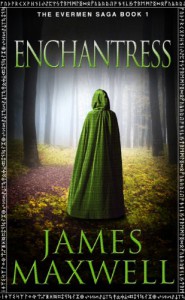
Enchantress (Evermen Saga #1)

Question: When an imprint of Amazon’s publishing arm picks up a previously self-published series, what do they do for the author other than spiff up the cover art and frequently discount the series to profit-destroying prices? I’m genuinely curious because, based on my impressions of Enchantress, “provide professional level editing” isn’t on the list of perks.
It was the time of the rains. The sky opened and water came out.
Told in such breath-taking prose as the quote above, Enchantress is the tale of two super speshul siblings, Mary Sue Ella and Gary Stu Miro. They are, of course, orphans of mysterious parentage. Ella is a gifted Enchantress who knows more than her teachers and is pretty but doesn’t know it (except when she’s flaunting her good looks for attention). All the men want her. All the women want to be her. Her only flaw seems to be a propensity to trust and/or spill her entire life story to any stranger who shows even a modicum of interest. Miro is a gifted swordsman who’s better, faster, stronger, and smarter than all the armies in all the lands, and opportunities to prove this come with astonishing regularity. All the women want him. All the men want to be him. His only flaw seems to be a complete and total lack of personality.
Despite the heavy-handed use of tropes and main characters born of wish-fulfillment, the story is quite good. The world-building is decent and the magic system is pretty damn cool. However, all these good points are tragically let down by weak writing and poor editing. Enchantress is rife with problems that should not have gotten past a competent editor.
We have repetition:
She felt tired now. “I’m so tired, but I wish I could do more.” (These are two of the six times in this one chapter the reader is told—not shown—that the character is tired.)
We have idiom abuse:
“I’m sorry, Your Grace, but in Seranthia we give short thrift to non-citizens.”
We have telling AND showing, because there wasn’t enough repetition already:
Killian had to take this opportunity. She was without her enchanted dress, her tools. She was naked.
[…Omitted paragraph in which Killian dwells on Ella’s physical perfection for fifth or sixth paragraph in two pages…]
Ella was defenseless, and he had to take this chance.
We have comma splicing and bonus repetition:
Killian’s voice continued expressively, he gave the story richness with his voice.
We have conjunction confusion:
He may have been thorough and rigorous, but he was also truthful.
The pacing is all over the place. Paragraphs are disjointed, making for some super awkward transitions between completely unrelated subjects. I could fill pages upon pages with examples, but then I’ll have officially put more work into this book than its editors did. More’s the pity. Time to heave a sigh and move on.
I will be reading the next book since I really do like the story (and since I bought the whole series during one of those profit-destroying sales). Here’s hoping the technical aspects improve.
 4
4


